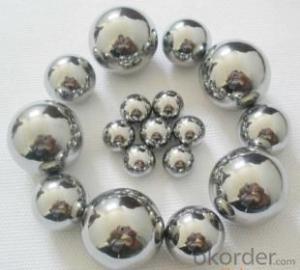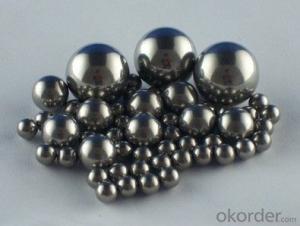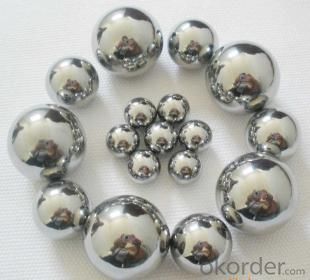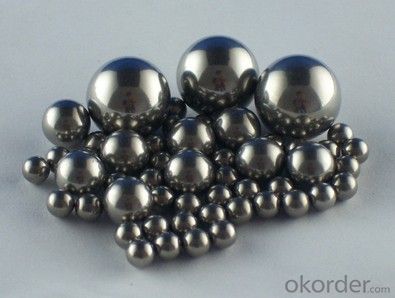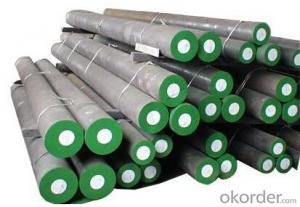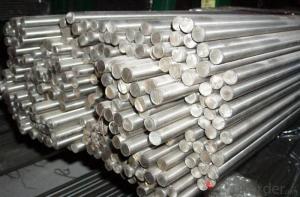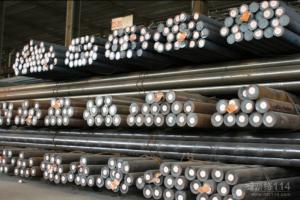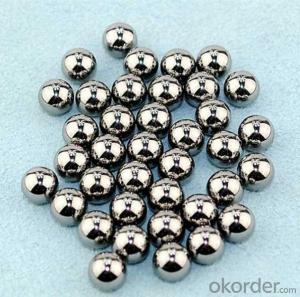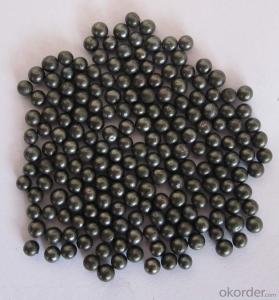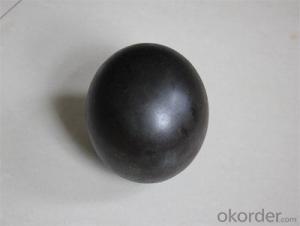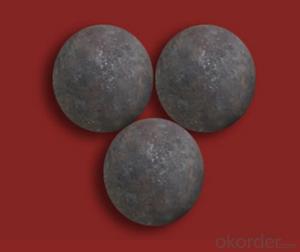Ball bearing steel balls
- Loading Port:
- China Main Port
- Payment Terms:
- TT OR LC
- Min Order Qty:
- -
- Supply Capability:
- -
OKorder Service Pledge
OKorder Financial Service
You Might Also Like
Quick Details
| Place of Origin: | Brand Name: | Model Number: | |||
| Material: | grade: | diameter: | |||
| certificate: | standard: | AISI: | |||
| feature: | stock: | sample: | |||
| leadtime: |
Packaging & Delivery
| Packaging Detail: | 3.5mm ball bearing steel balls 1.international standard package(carton, wooden box or pipe packing) 2.as customer's requireme |
| Delivery Detail: | 2~15days,if we have items in stock ,the leadtime will be 1day |
Specifications
Factory Cost 20mm steel ball
1.material: AISI304/316/440B/410/420B/201
2.grade:G10-G1000
3.Hardness:60-65HRC
4.sample:free
Product Name3.5mm ball bearing steel ballsServiceYour inquiry will be replied within 12 hours.
BrandCNBMMaterialStainless, carbon, chrome, aluminum, copper, precious metal plated , glass, plastic ball and etc.Size0.5mm-50.8mm
FeatureHigh polished, strong antiwear, high precision, easy storage.
Antirust WayProvide dry packaging & slushing oil packaging.GradeG10-G1000
HardnessHRC 58-62 (If you have special requirements, please tell us.)
SampleFree
StockThere are emergency stocks for regular sizes.
StandardGB/T308-2002, ISO3290:2001, ANSI/ASME Std. 10A-2001, DIN5401
Packing MethodStandard Seaworthy Export Packing or Customized Packing
Payment TermT/T, L/C, Western Union,
Delivery TimeWithin 2-15 days according to your required size & quantity.Using Range
Bicycles, Motor, Machinery, ElectricTools, Sports Apparatus, Medical Equipment, Chemicals, Aviation, Perfume Bottles, Sprayers, Valves, Nail Polish, Body Jewelry, Mobile Phone Panels, Toys and etc.
- Q: Can special steel be used in the manufacturing of household appliances?
- Yes, special steel can be used in the manufacturing of household appliances. Special steel, also known as alloy steel, offers a range of desirable properties such as high strength, durability, and resistance to corrosion and wear. These characteristics make it suitable for various applications, including the production of household appliances. Household appliances such as refrigerators, ovens, dishwashers, and washing machines require materials that can withstand constant use, high temperatures, and exposure to water and chemicals. Special steel fulfills these requirements and provides a reliable and long-lasting solution. For example, stainless steel is a type of special steel commonly used in household appliances due to its corrosion resistance and hygienic properties. It is used in appliance components such as refrigerator doors, oven interiors, and dishwasher interiors. Stainless steel is easy to clean, maintains its appearance over time, and does not react with food or other substances, making it an ideal choice for household appliances. Additionally, special steel alloys can be used to enhance specific properties needed in different appliances. For instance, heat-resistant alloys can be utilized in ovens or stovetops, while high-strength steel alloys can be employed in appliances that require structural integrity, like washing machines or dryers. In summary, special steel can definitely be used in the manufacturing of household appliances. Its various properties, including strength, durability, resistance to corrosion, and versatility, make it an excellent material choice for ensuring the performance, longevity, and safety of household appliances.
- Q: How are nickel-based alloys used in the aerospace industry?
- Nickel-based alloys are extensively used in the aerospace industry due to their excellent strength-to-weight ratio, high temperature resistance, and corrosion resistance. These alloys are commonly utilized in engine components, such as turbine blades and exhaust systems, to withstand the extreme operating conditions and increase fuel efficiency. Additionally, nickel-based alloys are employed in aircraft structural parts and landing gear due to their durability and ability to withstand high stress and fatigue. Overall, these alloys play a vital role in enhancing the performance and safety of aircraft in the aerospace industry.
- Q: How does special steel contribute to the construction machinery industry?
- Special steel plays a crucial role in the construction machinery industry by providing high-strength and durable components. These components are essential for heavy-duty applications in construction machinery, such as excavators, bulldozers, cranes, and loaders. One of the key contributions of special steel to the construction machinery industry is its ability to withstand extreme stress and load-bearing requirements. Construction machinery often operates under severe conditions, including heavy loads, vibrations, and impacts. Special steel, with its excellent mechanical properties, can resist these conditions and maintain its structural integrity, ensuring the safety and reliability of the equipment. Moreover, special steel is often used in critical components of construction machinery, such as booms, buckets, tracks, and gears. These components are subjected to intense wear and tear due to constant use in harsh environments. Special steel, engineered with enhanced hardness and wear resistance, helps extend the lifespan of these components, reducing maintenance costs and downtime. Additionally, special steel provides superior corrosion resistance, which is vital for construction machinery used in humid or corrosive environments. By preventing rust and decay, special steel helps maintain the equipment's performance and longevity, ultimately increasing productivity and efficiency in construction projects. Furthermore, special steel enables the construction machinery industry to achieve innovative designs and advanced functionalities. Its versatility allows for the creation of complex shapes and precise tolerances, which are essential for optimizing the performance and efficiency of machinery. Special steel also enables the incorporation of advanced technologies, such as sensors and automation, enhancing the accuracy and productivity of construction equipment. In summary, special steel contributes significantly to the construction machinery industry through its ability to withstand extreme conditions, provide superior wear resistance and corrosion protection, and enable innovative designs. By utilizing special steel in the manufacturing process, construction machinery manufacturers can ensure the durability, safety, and efficiency of their equipment, ultimately benefiting the construction industry as a whole.
- Q: Can special steel be used in the mining industry?
- Yes, special steel can be used in the mining industry. Special steel is known for its high strength, durability, and resistance to wear and corrosion, making it suitable for various applications in mining such as drilling equipment, crushers, conveyor systems, and extraction machinery. Additionally, special steel can withstand harsh operating conditions and extreme temperatures commonly encountered in mining operations, making it a reliable and efficient choice for this industry.
- Q: How is special steel recycled?
- Special steel is typically recycled through a process called electric arc furnace (EAF) steelmaking. In this process, scrap steel is collected and melted down in an electric arc furnace, where high temperatures are used to separate impurities. Once the impurities are removed, the molten steel is then refined and cast into new forms to create various specialized steel products, ensuring that the steel is effectively recycled and reused.
- Q: What are the main applications of special steel in the packaging industry?
- The main applications of special steel in the packaging industry include the manufacturing of containers, cans, and closures. Special steel offers excellent strength, durability, and corrosion resistance, making it suitable for packaging materials that need to withstand various environmental conditions and protect the contents inside. Its high tensile strength also allows for thinner and lighter packaging, reducing material usage and transportation costs. Additionally, special steel is used in machinery and equipment used for packaging processes, ensuring efficiency and reliability in the production line.
- Q: How does special steel contribute to the magnetic properties of products?
- The unique composition and structure of special steel contribute to the magnetic properties of products. This type of steel, also known as alloy steel, contains specific elements like nickel, chromium, manganese, and molybdenum, which alter its magnetic behavior. Depending on the desired application, these elements can either enhance or suppress the magnetism of the steel. For example, the addition of nickel increases the magnetic permeability of steel, making it more responsive to magnetic fields. This characteristic is extremely beneficial in applications such as transformers, where efficient magnetic flux conduction is necessary. Similarly, the inclusion of other magnetic elements like cobalt or iron can also improve the magnetic properties of special steel. On the other hand, certain elements can reduce or eliminate the magnetic qualities of steel. Chromium, for instance, is famous for its non-magnetic properties. When chromium is added to steel, it decreases its magnetic permeability, making it suitable for applications that require non-magnetic features, like medical equipment or electronics. Moreover, the magnetic properties of special steel are influenced by its structure. Heat treatment processes can manipulate the crystalline structure of the steel, thereby affecting its magnetization. For instance, annealing the steel can increase the size of the crystal grains, resulting in reduced magnetization. Conversely, cold working or quenching the steel can create a finer grain structure, enhancing its magnetic properties. In summary, by incorporating specific elements and manipulating its structure, special steel contributes to the magnetic properties of products. Depending on the application requirements, these elements can either enhance or suppress magnetism. The ability to tailor the magnetic properties of special steel makes it highly valuable in industries such as telecommunications, energy, and electronics.
- Q: What are the different heat treatment grades of special steel?
- There are several heat treatment grades of special steel, including annealed, normalized, quenched and tempered, and hardened and tempered.
- Q: How does special steel perform in terms of wear resistance in abrasive environments?
- Special steel is known for its exceptional wear resistance in abrasive environments. The unique composition and heat treatment processes used in the production of special steel result in a higher hardness level compared to standard steels. This increased hardness makes special steel highly resistant to wear caused by abrasive particles or surfaces. In abrasive environments where friction and contact with hard materials are prevalent, special steel exhibits excellent performance. It can withstand the erosive effects of abrasive particles, such as sand, rocks, or metal fragments, without significant wear or damage. This durability makes special steel an ideal choice for various applications, including mining equipment, cutting tools, industrial machinery, and automotive components. Moreover, the wear resistance of special steel is not only limited to its surface but also extends throughout its structure. This means that even if the surface of the steel is scratched or abraded, the underlying material remains highly resistant to wear. This characteristic ensures a prolonged lifespan of components made from special steel, reducing maintenance costs and downtime. Furthermore, special steel can maintain its wear resistance even under high temperatures. This property is particularly advantageous in abrasive environments where friction-induced heat can accelerate wear. The ability of special steel to retain its hardness and wear resistance at elevated temperatures ensures its effectiveness in demanding applications like high-speed machining or hot forging. Overall, special steel outperforms standard steels in terms of wear resistance in abrasive environments. Its superior hardness, structural integrity, and temperature resistance make it an excellent choice for applications where durability and longevity are essential.
- Q: What are the main applications of special steel in the textile industry?
- Special steel is commonly used in the textile industry for various applications. One of the main applications is in the production of textile machinery, such as looms, spinning frames, and knitting machines. The use of special steel ensures high strength, durability, and precision in these machines, leading to increased productivity and efficiency in textile manufacturing. Additionally, special steel is utilized in the production of textile cutting tools, such as blades and needles, which require excellent hardness and wear resistance. These tools enable precise and efficient cutting of fabrics, contributing to the overall quality of textile products. In summary, special steel plays a crucial role in the textile industry by providing strong and durable machinery and high-performance cutting tools.
Send your message to us
Ball bearing steel balls
- Loading Port:
- China Main Port
- Payment Terms:
- TT OR LC
- Min Order Qty:
- -
- Supply Capability:
- -
OKorder Service Pledge
OKorder Financial Service
Similar products
Hot products
Hot Searches
Related keywords
